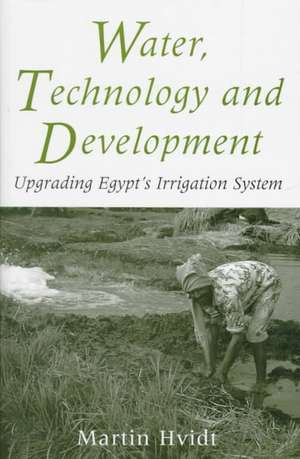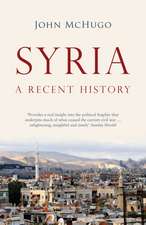Water, Technology and Development: Upgrading Egypt's Irrigation System: Library of Modern Middle East Studies
Autor Martin Hvidten Limba Engleză Hardback – 30 dec 1998
Din seria Library of Modern Middle East Studies
- 30%
 Preț: 509.07 lei
Preț: 509.07 lei - 19%
 Preț: 467.21 lei
Preț: 467.21 lei -
 Preț: 166.82 lei
Preț: 166.82 lei -
 Preț: 158.64 lei
Preț: 158.64 lei - 31%
 Preț: 713.72 lei
Preț: 713.72 lei - 31%
 Preț: 712.90 lei
Preț: 712.90 lei - 31%
 Preț: 773.05 lei
Preț: 773.05 lei - 22%
 Preț: 269.28 lei
Preț: 269.28 lei - 19%
 Preț: 172.02 lei
Preț: 172.02 lei - 30%
 Preț: 773.88 lei
Preț: 773.88 lei - 31%
 Preț: 713.72 lei
Preț: 713.72 lei - 30%
 Preț: 510.49 lei
Preț: 510.49 lei - 30%
 Preț: 714.12 lei
Preț: 714.12 lei - 26%
 Preț: 716.00 lei
Preț: 716.00 lei - 31%
 Preț: 772.74 lei
Preț: 772.74 lei - 18%
 Preț: 167.24 lei
Preț: 167.24 lei - 31%
 Preț: 772.98 lei
Preț: 772.98 lei - 30%
 Preț: 774.01 lei
Preț: 774.01 lei - 31%
 Preț: 772.58 lei
Preț: 772.58 lei - 30%
 Preț: 715.34 lei
Preț: 715.34 lei - 31%
 Preț: 773.23 lei
Preț: 773.23 lei - 30%
 Preț: 773.75 lei
Preț: 773.75 lei
Preț: 716.63 lei
Preț vechi: 1028.88 lei
-30% Nou
Puncte Express: 1075
Preț estimativ în valută:
137.16€ • 142.64$ • 114.77£
137.16€ • 142.64$ • 114.77£
Carte tipărită la comandă
Livrare economică 15-29 martie
Preluare comenzi: 021 569.72.76
Specificații
ISBN-13: 9781860642166
ISBN-10: 1860642160
Pagini: 312
Ilustrații: Illustrations, 1 map, ports.
Dimensiuni: 138 x 216 x 25 mm
Greutate: 0.59 kg
Editura: Bloomsbury Publishing
Colecția I.B.Tauris
Seria Library of Modern Middle East Studies
Locul publicării:London, United Kingdom
ISBN-10: 1860642160
Pagini: 312
Ilustrații: Illustrations, 1 map, ports.
Dimensiuni: 138 x 216 x 25 mm
Greutate: 0.59 kg
Editura: Bloomsbury Publishing
Colecția I.B.Tauris
Seria Library of Modern Middle East Studies
Locul publicării:London, United Kingdom
Cuprins
Part 1 Irrigation in Egypt - the traditional and the new system: the agricultural sector of Egypt; three problems faced by the agricultural sector; the irrigaiton improvement project; the traditional Egyptian irrigaiton system; the IIP improvements. Part 2 The improvement of irrigation system performance - a review of the literature: the irrigaiton management tradition; the reasons for system improvement; the performance of public irrigaiton systems; major determinants of the improvement of irrigaiton system performance; approaches to the improvement of irrigation system performance; conclusion - the characteristics and problems of the research field. Part 3 Towards an analytic framework: the theoretical framework; basic assumption and concepts; hypotheses; what can the study contribute? Part 4 Methodology: sources; the design of the field survey; the validity of the field survey; evidence of internal validity in the field survey; conclusion - internal and external validity. Part 5 Three filed survey areas: the Herz-Numaniya command area; Beni Ibeid command area; the Qiman el Arus command area. Part 6 Improving farmers' water control: the survey findings; bivariate analyses; combining evidence. Part 7 Saving scarce land resources: findings; savings in land; discussion. Part 8 Increasing farm income: a framework for analysis; presentation of findings; combining evidence. Part 9 The impact of the DSC package; a demand-driven spread of the DSC package? can the findings be generalized?













